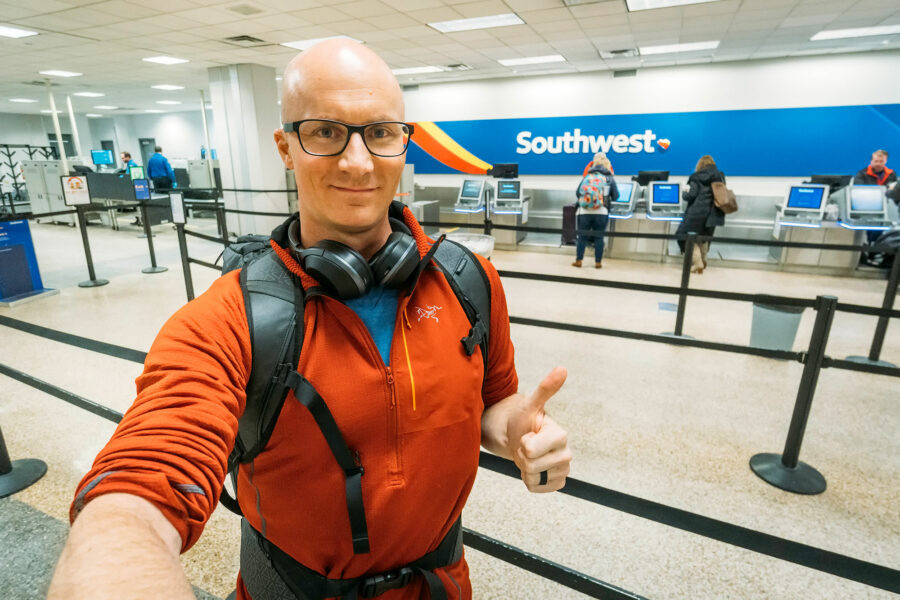Saving money and traveling the world is achievable with the right strategies. Savewhere.net provides valuable insights and practical tips to help you manage your finances and turn your travel dreams into reality. Start planning your adventure today! With careful financial planning, reducing expenses, and smart travel strategies, anyone can explore the globe without breaking the bank. Begin your journey towards affordable adventures now!
1. Embrace Financial Responsibility for Travel
Are you ready to take control of your finances and make travel a reality? Financial responsibility is the foundation for saving money for travel. It involves being honest with yourself about your current financial habits and taking steps to improve them. According to a survey by the U.S. Financial Literacy and Education Commission, only 57% of U.S. adults have a budget. Developing good financial habits is essential for achieving your travel goals.
- Acknowledge Your Current Habits: The first step is to honestly assess your current spending and saving habits.
- Master the Basics: Revisit and reinforce your understanding of fundamental financial principles.
- Commit for the Long Term: Recognize that saving for travel is a marathon, not a sprint.
- Take Ownership: Understand that your financial success is your responsibility alone.
2. Track Your Spending Diligently
Do you know where your money is going each month? Tracking your spending is crucial to identifying areas where you can save. Many people find the idea of meticulously tracking expenses daunting, but it’s a powerful tool for gaining control over your finances. A recent study by the Consumer Financial Protection Bureau (CFPB) found that people who track their expenses are more likely to save money and achieve their financial goals.
- Dedicate Time: Set aside time to review all your accounts and expenditures.
- Identify Leaks: Pinpoint areas where you’re spending money unnecessarily.
- Record Everything: Document all expenses, no matter how small.
- Face the Facts: Confront your spending habits without judgment.
 Budgeting Money for Travel
Budgeting Money for Travel
3. Create a Travel Budget and Stick to It
How can you effectively budget for both your trip and your everyday life? Budgeting is essential for achieving your travel savings goals. It involves estimating the cost of your trip and allocating funds accordingly, as well as managing your daily expenses to maximize savings.
- Estimate Travel Costs: Research and determine the total cost of your trip, including transportation, accommodation, and activities.
- Set a Savings Goal: Calculate how much you need to save each month to reach your travel fund target.
- Allocate Funds: Assign specific amounts to recurring and flexible expenses.
- Maintain Control: Monitor your spending to avoid overspending and stay on track.
4. Reduce Unnecessary Expenses Immediately
Are you ready to cut back on non-essential spending? Reducing unnecessary expenses is a straightforward way to free up funds for travel. Identifying and eliminating “wants” can significantly boost your savings.
- Distinguish Needs vs. Wants: Create a list of your expenses and categorize them as either needs or wants.
- Assess Your “Wants”: Evaluate the cost of each item in the “wants” column.
- Eliminate Non-Essentials: Stop buying things you don’t truly need.
- Resist Marketing: Be mindful of marketing tactics that encourage unnecessary purchases.
5. Develop Money-Saving Habits Daily
What simple habits can you incorporate into your daily routine to save money? Developing money-saving habits can significantly reduce your daily costs. Replacing expensive habits with cost-effective alternatives can add up to substantial savings over time.
- Walk or Bike: Opt for walking or cycling instead of driving or taking public transport.
- Cook Your Own Meals: Prepare meals at home instead of eating out.
- Learn New Skills: Acquire skills that can reduce your daily costs.
- Prepare Your Own: Make your own coffee and snacks to avoid expensive cafe purchases.
 Cook Your Own Meals
Cook Your Own Meals
6. Minimize Accommodation Costs
How can you significantly reduce your accommodation expenses? Reducing accommodation costs can free up a substantial amount of money for travel. Exploring alternative housing arrangements can lead to significant savings.
- Share Housing: Take on a roommate to split rent and utilities.
- Downsize: Move into a smaller, more affordable apartment.
- Live with Family: Consider moving in with parents or relatives temporarily.
- Rent Out Your Home: Rent out your current home and move somewhere cheaper.
7. Sell Unused Possessions and Declutter
Do you have items you no longer need that could be turned into cash? Selling unused possessions can provide a quick influx of cash for your travel fund. Decluttering your home and selling items you don’t need can be a win-win situation.
- Evaluate Your Belongings: Identify items that are worth money and can be sold.
- Sell Your Car: Consider selling your car and using public transport or a bicycle.
- Use Online Platforms: Utilize platforms like eBay and Craigslist to sell your items.
- Declutter Regularly: Make decluttering a regular habit to identify more items for sale.
8. Explore Additional Ways to Save Money
What are some other lifestyle changes you can make to save money? Combining multiple money-saving strategies can significantly increase your savings. Small changes to your lifestyle can have a big impact on your ability to save for travel.
- Reduce Entertainment Expenses: Invite friends over for movie nights instead of going to the theater.
- Cook at Home More Often: Learn to cook and prepare your own meals.
- Shop Around for Groceries: Compare prices and shop at discount stores.
- Cut Your Landline: Rely solely on your cellphone for communication.
- Ditch Cable TV: Stream content online or find free entertainment options.
- Quit the Gym: Exercise outdoors or use bodyweight exercises.
- Slash Your Shopping: Avoid unnecessary purchases and limit your shopping trips.
- Reduce Utility Usage: Turn off lights and appliances when not in use.
9. Earn Additional Income on the Side
Are you looking for ways to boost your income in your spare time? Earning extra money through a side hustle can accelerate your savings. Finding a part-time job or starting a small business can significantly increase your income.
- Find a Side Hustle: Look for part-time work that fits your skills and interests.
- Sell Arts and Crafts: Create and sell handmade items on Etsy.
- Resell Items: Buy items at garage sales and resell them on eBay.
- Provide Pet Care: Offer pet-sitting or dog-walking services.
- Tutor Students: Tutor students online in subjects you excel in.
- Babysit: Provide babysitting services for families in your area.
- Transcribe Videos: Transcribe videos for online content creators.
- Sell Blood Plasma: Donate blood plasma for compensation.
 Earn More Money
Earn More Money
10. Evaluate Your Current Employment
Is your current job providing you with enough income and opportunities? Evaluating your employment situation can lead to higher earnings or better work-life balance. Negotiating a raise or finding a new job can significantly impact your ability to save.
- Ask for a Raise: If you deserve it, request a raise from your employer.
- Renegotiate Your Terms: Ask about cutting back hours or working from home.
- Look for a Better Job: Search for a higher-paying job with better benefits.
- Train for a New Career: Acquire skills that can lead to higher-paying job opportunities.
11. Generate Income While Traveling
How can you earn money while exploring the world? Earning money while traveling can help sustain your adventures and reduce the amount you need to save upfront. Many online and remote job opportunities allow you to work from anywhere in the world.
- Affiliate Marketing: Promote products or services and earn a commission on sales.
- Freelance Writing: Write articles or content for websites and publications.
- Graphic Design: Offer graphic design services to clients online.
- Computer Programming: Work as a freelance computer programmer.
- Virtual Assistant: Provide administrative, technical, or creative assistance to clients from a remote location.
- Online Language Translation: Translate documents or content online.
12. Access Resources and Tools to Save Money
Where can you find helpful resources to assist you in saving money for travel? Accessing resources and tools can provide valuable support and guidance in your savings journey. Savewhere.net offers various resources to help you track spending, budget effectively, and find deals.
- Financial Planning Apps: Use apps like Mint and Personal Capital to track expenses and create budgets.
- Budgeting Workshops: Attend free online budgeting workshops to learn essential skills.
- Travel Deal Websites: Utilize websites like Skyscanner and Google Flights to find cheap flights and accommodations.
- Coupon Websites: Visit websites like Coupons.com and RetailMeNot to find discounts on everyday purchases.
- Savewhere.net: Explore Savewhere.net for tips, tricks, and resources to help you manage your finances and save money for travel. Address: 100 Peachtree St NW, Atlanta, GA 30303, United States. Phone: +1 (404) 656-2000.
FAQ: How to Save Money and Travel
1. How much money do I need to save to travel the world?
The amount of money you need to save depends on your travel style, destination, and duration of travel. A general guideline is to budget at least $1,500 per month for long-term budget travel. For example, if you plan to travel for six months, you should have at least $9,000 saved.
2. What are the best ways to track my spending?
The best ways to track your spending include using budgeting apps like Mint and Personal Capital, creating a spreadsheet to log expenses, or keeping a notebook to write down all purchases. Choose a method that works best for you and be consistent with tracking.
3. How can I reduce my daily expenses?
You can reduce your daily expenses by cooking your own meals, walking or biking instead of driving, cutting unnecessary subscriptions, and avoiding impulse purchases. Small changes in your daily habits can lead to significant savings over time.
4. What are some side hustles I can do to earn extra money?
Some side hustles you can do to earn extra money include freelancing, selling arts and crafts on Etsy, providing pet care services, tutoring students online, and selling items on eBay. Choose a side hustle that matches your skills and interests.
5. How can I find cheap flights and accommodations?
You can find cheap flights and accommodations by using travel deal websites like Skyscanner and Google Flights, being flexible with your travel dates, booking in advance or at the last minute, and considering alternative accommodations like hostels or Airbnb.
6. What are the best budgeting apps to use?
The best budgeting apps to use include Mint, Personal Capital, YNAB (You Need a Budget), and PocketGuard. These apps help you track your spending, create budgets, and set financial goals.
7. How can I stay motivated to save money for travel?
You can stay motivated to save money for travel by setting clear goals, visualizing your dream trip, tracking your progress, rewarding yourself for reaching milestones, and finding a travel buddy to share the experience with.
8. What are some resources to help me save money?
Some resources to help you save money include Savewhere.net, financial planning apps, budgeting workshops, coupon websites, and personal finance blogs. These resources provide valuable tips, tools, and guidance to help you manage your finances and save money.
9. How can I earn money while traveling?
You can earn money while traveling by freelancing, working as a virtual assistant, teaching English online, creating and selling content, and doing remote work. Make sure to have a reliable internet connection and the necessary equipment to perform your job.
10. What are some common mistakes to avoid when saving for travel?
Some common mistakes to avoid when saving for travel include not tracking your spending, not creating a budget, overspending on non-essentials, not having an emergency fund, and not planning for unexpected expenses. Be disciplined and organized to avoid these pitfalls.
By implementing these strategies and utilizing the resources available at savewhere.net, you can achieve your travel dreams and explore the world without breaking the bank. Start planning your adventure today!

